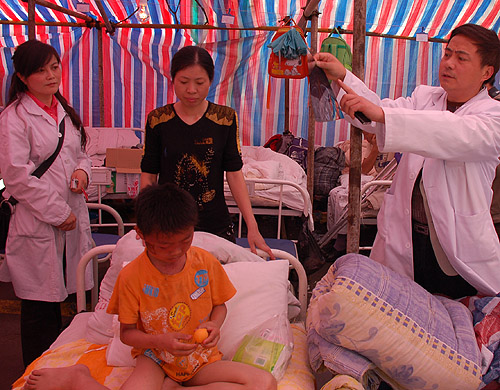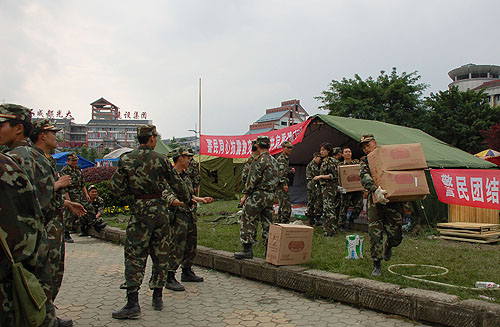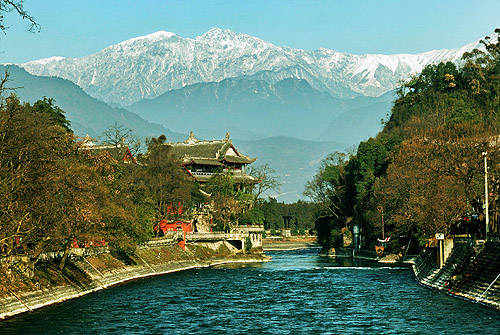In Xipu Township, Pixian County, about 30 km away from Dujiangyan, three big tents had already been set up around the main building of the local hospital to receive the injured.
"We moved the beds out of the building to avoid aftershocks," said Gan Huashan, the hospital's president. He added that the hospital had taken in 96 earthquake patients as of May 14 and nearly half of them had recovered and moved out of the hospital.
Among the patients there, most of whom suffered trauma and fractures, was a boy wearing a eye-catching orange T-shirt who sat quietly on a bed. He focused on the food in his hands and kept his head down to avoid the attention of others to the big scar on the right side of his face.

A woman sits with her dog outside a tent given to her by the government as part of its relief work in Dujiangyan.
"I really miss my school and my classmates now," the boy, named Xiong Yao, told Beijing Review, avoiding eye contact as he spoke. His mother, who stood beside him, cut in to explain how her 10-year-old son had ended up in hospital. She didn't want him to relive the frightening memory on the afternoon of May 12.
Xiong, who was a Grade-4 student in the local primary school, was crushed in the stampede of students rushing down the stairs of their building after the earthquake struck. He was trampled so badly that he suffered from shock and lost consciousness.
"The nurses cried when my little boy was taken to hospital by a school security guard and a gym teacher, they had never seen a kid so badly injured. The doctors tried their best to save him and they didn't believe it when my boy finally recovered. It was like a miracle," the mother said.
The earthquake patients in the hospital received free treatment and accommodation and the government was responsible for their food, said President Gan.
"The doctors and nurses were so kind and they had treated my boy with great care. I'm so grateful to everyone who has helped us," said the mother.
The quake has seen strangers helping others before thinking of themselves. A woman surnamed Cai in her fifties and living in a tent in Dujiangyan would never forget the moment when a stranger gave her 4-year-old grandson three steamed buns.
"He was also an earthquake sufferer who has little food himself. He was all alone as he had lost all his family members in the earthquake. He said now all he could do was help the children," Cai said.

The army distributes relief supplies in Dujiangyan.
In the provincial capital city Chengdu, people were taking the initiative to help sufferers. Long queues had formed to donate blood in front of dozens of the blood donation stations in the city. Chen Dongliang, a company employee, had never donated blood before but he asked a day's leave from his company to make a donation.
"I feel like I must do something to help them when I saw the victims on TV," Chen said, adding that after the donation he would go to the supermarket with several colleagues to buy some food and water and then they would drive to Dujiangyan to work as a volunteer.

A panoramic view of Dujiangyan
(Beijing Review May 15, 2008)